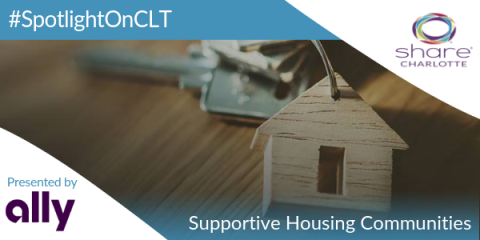#SpotlightOnCLT: Supportive Housing Communities
The foundation of Maslow's Heirarchy of Needs pyramid, you pysiological needs (food, water, warmth, rest), are probably met and checked off the list on ay given day. Chances are if you’re reading this, you’re probably more focused on the higher levels of the pyramid: Love, Self-Esteem, and perhaps, Self-Actualization. Your desire to learn more about SHARE Charlotte’s partner Supportive Housing Communities and your ability to take interest in others means the basics are covered - you have shelter, food, clothing, and safety.
However, this is not the case for many people sleeping on the streets, in abandoned buildings, or on benches of our own City. On any given night, more that 2,000 men, women, and families lack a safe place to sleep.
In 2014, after attending the National Alliance to End Homelessness Conference, a group of concerned Charlotteans who we’ll refer to hereafter as the Homelessness Dream Team, returned home. They discussed what was learned, what must be shared and how they could collaborate to address homelessness in our City.
Thus, the Communities Coordinated Entry System began. This system is a resource for anyone looking for housing. The 211 call center is the entry point and if a person is actually homeless they will be sent to an in-person interview to be assessed for vulnerability. The most vulnerable people are placed in available housing first.
You may be curious what constitutes vulnerability. In terms of homelessness, vulnerability is measured by how many disabilities you are living with and how severe they are. Availability of support systems are an important factor as are the availability of people you can rely on when you’re in trouble. As Pamela Jefsen, CEO of Supportive Housing Communities told me, “The short definition to vulnerability is an assessment of who is most likely to die on our streets without housing.”
There are quite a few nonprofits addressing homelessness - some help men only, some women only, some only those with addictions, others those who have been sober for a certain period of time but Supportive Housing Communities has options for all types of clients. SHC offers two program options to clients: permanent supportive housing and a rapid rehousing program that lasts up to two years. Case Managers meet people where they are and help them set goals for where they want to be. Peer Support Specialists, who have lived experience, are also part of the support team. They all provide crucial SHC support.
As Jefsen explained to me, “Our residents come in chronically homeless and living with at least one disability. They’ve been homeless for at least a year in some cases up to 12 years.. They may have no income. You can imagine there are a lot of hurdles that they have to overcome. Our case manager rate is 1 to 15 clients. Case managers help residents figure out what they need, what their goals are. They meet one-on-one and work with the clients on their mental health and physical health issues. In some cases residents are looking to lessen or not be involved in any substance use. Whatever it is that an incoming resident needs, we will provide it to them or connect them to a community partner.”
Jefsen is instrumental in coordinating services for the homeless. Last year,, Supportive Housing Communities served 300 people with housing and support and 402 people with street outreach services. 97% of their residents remain stable in housing. By contributing to SHC, you are helping reduce the cost that taxpayers pay for that same person. It’s only ⅓ the cost if a homeless person is given resources and a safe place to live rather than utilizing public services.
SHC welcomes volunteer activities for their residents at McCreesh Place, St. John’s Place and at scattered housing sites throughout Mecklenburg County. Let’s gather together to help meet their needs, especially when Supportive Housing Communities is just that - a Charlotte organization dedicated to making sure that everyone has a safe place to sleep and part of a community. Let’s help remove hurdles by supporting an organization that is wrapping their arms around the most vulnerable in our community.




